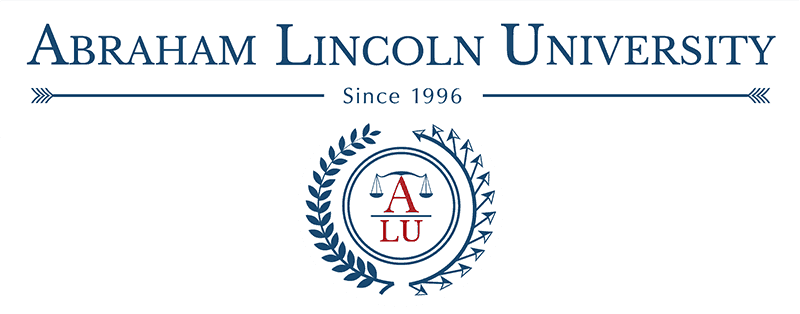The American Bar Association’s average passage rate for first-time takers who took the exam in February 2017 was 45% with schools in other categories coming in significantly lower. ALU is proud to announce that their bar passage rate is higher than the average rate recorded for test takers coming from California ABA schools, as well as schools from all other categories. With a passage rate of 50%, ALU managed to outpace its own category (unaccredited distance learning) by 32%.
The State Bar of California is notorious for being the most difficult bar exam in the U.S. to pass. According to their statistics, the results for first-time takers were as follows:
California ABA: 45%
Out-of-State ABA: 39%
Unaccredited: Fixed-Facility: 25%
Unaccredited: Correspondence: 26%
California Accredited (but not ABA): 18%
Unaccredited Distance Learning: 18%
According to pundits, and incoming students, these results could be interpreted to mean that Abraham Lincoln University, at $8,000 per year (as of June 2017) has an education that exceeds California ABA law schools. As a law professor, director, and academic law school advisor for Abraham Lincoln University, I am tempted to agree with the pundits. However, being an educator for over six years, I have found that bar passage statistics don’t always tell the whole story. In fact, it hardly seems to matter if a student attended an accredited or unaccredited school, the most important criteria for bar passage rates is, drum roll please…………the student’s diligence in studying for the exam. This proves what many students who opt for a more affordable, unaccredited and even online education know already, that your education is what YOU make of it.
I am not the only professional who believes this, researchers Alan Krueger and Stacy Berg Dale investigated if the school or the student really mattered (Who Needs Harvard https://www.brookings.edu/articles/who-needs-harvard/). The study found that students that were accepted into an IVY League school, but who instead decided to attend a moderately selective school, actually made roughly the same salaries as the students who chose to invest in the IVY League. What this means is, the students, not the school, was responsible for their success.
This is not to state that a university’s methods won’t help. They will help, but not in the way that students are often taught to believe. In my experience, there is always some first-year law students with the idea that the university will teach them everything that they need to know to pass the bar exam. These are the students that generally fail because they place the responsibility of their success completely on the university. A baby will never learn to walk if they depend completely on their walker. The walker is designed to give them additional strength for their development, but at some point, it’s up to them to ditch the device and use their newly acquired strength to balance themselves. It is this innate curiosity and determination that helps a student pass the general bar and, ultimately, what makes them an excellent lawyer. How do I know this? Just speak with anyone who passed the bar exam and ask them this question, “Did you need to study materials outside of what was required to pass the exam?” The answer will likely be, “Duh….of course.”
What a great university WILL and should do is foster a supportive environment that helps maximize a student’s time and inspire them to master each subject area.
Traditional law schools like to delve into laws and theories that tackle confusing issues, and cases that contradict each other, to determine the nuances of different policy rationales. 90% of the time these theories aren’t even on the bar exam and, in fact, must be unlearned when taking a bar prep course ultimately wasting precious amounts of a student’s time.
At Abraham Lincoln University, we tailor our educational culture to the needs of students who work full time or already have developed careers. These students don’t have extra time to be inspired by minute theories that won’t be on the bar exam, or that don’t enhance their practical education. The environment they need is one that inspires self-direction and maintains a consistent presence to guide them. What a great legal education comes down to is a balance stricken between theories and case studies that will mold students into reputable and successful lawyers and the practical analysis and application of the law that will help them pass the Bar exam. Abraham Lincoln University understands the importance of this balance because 90% of their student body are working full-time professionals with careers demanding 40 plus hours a week. Time is of the essence for these students, but they must compete with the vast majority of ABA students that study and attend classes full time. So universities like ALU must teach enhanced courses to help these students maximize their time. ALU’s enhanced course material and a gingerly balanced curriculum are what, time and time again, enables students, who truly want to become attorneys, to pass the bar exam.
Now I state, “ALU students who truly want to become attorneys” because many ALU students don’t. This is also where bar statistics should be thrown out the window. Not all students who attend law school want to become lawyers and therefore it isn’t important for them to pass the bar. Many of our students are medical doctors, human resource directors, continuing educators and lifelong learners, proving that a legal education can serve a variety of industries, adding a professional boost to most resumes. The fact that pundits group all law schools together are abhorrent and grossly misleading. I would say a solid one-third of our students simply want to know more about the law, contracts and other legal information that they can apply to their chosen field. The other two-thirds are amidst a career change or actually want to become a practicing attorney. If you take this into consideration, our 50% bar passage rate for this February is even more staggering.
So when choosing a law school or any school of higher education, don’t just rely on bar passage numbers or statistics.
It is more crucial, instead, to focus on the school’s philosophy and culture, which will have more influence on shaping the kind of student you will be and ultimately the kind of professional you will become after you graduate.
I’m proud to say that I’m an educator at an online school because the structure enables underserved students to thrive and learn about the law. The law isn’t only for the few, prestigious, full time, mid-twenties students, it’s for anyone who wants to know more about our nation’s history or who desires to advance their career. Law school can be for a corporate leader, an educational director or a political activist. Knowing the law is empowering, and if ALU can empower more people then it is crucial that students from a variety of backgrounds understand what bar passage rates truly mean.






